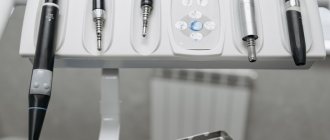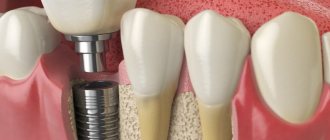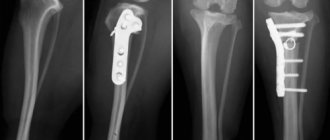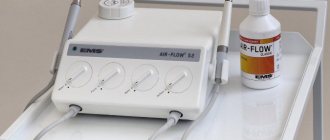Representatives of the fair sex are especially careful about the beauty of their smile. Daily oral hygiene, timely treatment of caries, professional cleaning, whitening, dental restoration, and other dental procedures help maintain the health and aesthetics of the dental system. However, even careful care does not guarantee the loss of teeth. If this happens, then implantation is the best way to restore the dentition. However, this method is associated with some difficulties due to the characteristics of the female body, especially during menstruation or pregnancy.
Is it possible to install dental implants during “critical days”
In addition to the classic contraindications, women also need to remember additional ones, which are:
- breastfeeding period;
- pregnancy;
- menstruation.
Since implantation is not performed due to acute pain, which is observed in the presence of many other dental problems, it can be performed at a more appropriate time. “Critical days” do not last long, so it is recommended to consult a doctor after they are over, after the body and hormones have been restored to normal levels.
Menstruation can occur in different ways. Some women feel significant pain, while others notice little difference from other days. Also, certain days are considered the most painful, which is associated with bleeding, pain and a feeling of weakness. In this regard, doctors do not recommend installing an implant or performing other surgical procedures during this period of 3-7 days, since the body is weakened.
It is important to mention the fact that the body may react differently to medications during menstruation, as a result of which pain medications may not be as effective. This requires the use of an increased dosage, which poses an additional danger.
Briefly about implantation
This is a dental operation to implant artificial roots in place of lost teeth. Implants are installed using two-stage and one-stage treatment protocols. The classic method involves the implantation of titanium rods in two stages: first, installation of an implant, and six months later, prosthetics with crowns.
One-step protocols allow the installation of artificial roots with immediate loading of the prostheses. Treatment takes only a few days. These technologies are used simultaneously with the removal of a dental unit (simultaneous implantation), the loss of several elements, or in the complete absence of teeth (zygomatic, basal implantation, All-on-4 or All-on-6).
Problematic blood clotting
Implantation involves an incision in the gum, which causes some blood loss. If blood clotting is normal, the wound heals quite quickly, the tissues are restored, and the bleeding itself does not last long. During menstruation, faster blood clotting is observed, which can lead to the formation of blood clots in the vascular beds. This can cause blockage of blood vessels and disruption of adequate blood flow and oxygen supply to tissues, which negatively affects the functioning of various organs.
Menstruation and dental implantation: what doctors say
When planning an operation, the dentist asks the woman about the date of her critical days. If they fall on the date of installation of the implants, the doctor reschedules the treatment. The procedure is prescribed a few days, or better yet, a week before the start of menstruation. That is, it is contraindicated during menstruation.
This restriction applies to any surgical intervention unless it is an emergency. This is due to the fact that tissues are injured and for their restoration the body must be in a stable state. During menstruation, the stability of many systems of the female body is disrupted, which means health complications may arise.
Any doctor will refuse implantation to a patient if she is having her period during her period.
What happens to a woman's body during menstruation
During this difficult period for a woman, her body experiences stress, her immunity decreases, and the following changes occur that can significantly affect her well-being during dental implantation:
- the pain threshold increases: this means that even minor injuries can seem very painful. And analgesics and even strong anesthesia may simply be ineffective during this period. For example, it is also not recommended to remove teeth during menstruation (although with one-step implantation methods, two procedures can be carried out simultaneously), because in this state a woman can simply lose consciousness from pain shock. Even though the procedure is not actually that painful, and when anesthesia is used, it generally takes place without any discomfort,
- it is difficult to relieve pain after surgery: even if the procedure was successful, after the intervention you cannot avoid the body’s natural reaction and pain, and pills may not cope,
- blood clotting is impaired: during this period, the number of platelets in a woman’s blood sharply decreases (by 40-60% compared to the norm), which are precisely responsible for good blood clotting after any surgical interventions. This mechanism is programmed by nature and allows you to avoid the occurrence of blood clots, blockage of blood vessels, and the formation of clots in internal organs during “critical days”,
- immunity sharply decreases and at the same time the risk of contracting an infection increases. He will accompany you both during the installation of implants, if sterility was violated, and during the rehabilitation period. Indeed, in such conditions, the entry of even a small number of pathogenic bacteria into the wound can result in severe infectious inflammation, suppuration, peri-implantitis,
- Blood pressure drops: against this background, headaches and malaise occur.
What effect does progesterone have on the mucous membranes of the uterus?
Progesterone is the most important hormone throughout pregnancy. It is involved in preparing the endometrium for implantation of a fertilized egg, fetal development, and prevents premature birth. The cause of bleeding from the vagina, including on days when a woman previously had menstruation, may be a lack of this hormone.
Hormonal bleeding left unattended can lead to spontaneous abortion.
However, in most cases, with timely treatment, it is possible to relieve the deficiency condition and minimize risks.
Possible complications when implanting teeth simultaneously with menstruation
Installing implants can cause negative reactions in the body, even if the patient does not menstruate. However, against the background of hormonal changes, they become more pronounced and dangerous.
Severe bleeding and blood clots
Unlike classical implantation, one-stage treatment protocols do not involve major surgical intervention. However, even with a small puncture in the gum, blood vessels are damaged. Since platelet production is reduced, it is difficult to stop the bleeding. In this case, the wound does not heal, remaining open to access by pathogenic microorganisms.
Despite this feature of the menstrual period, sometimes the exact opposite situation occurs. Soft tissue injuries can activate platelet production, which is very bad during menstruation. The blood will begin to thicken uncontrollably, transforming into clots that can clog blood vessels. Blockage of blood vessels by blood clots leads to decreased tissue nutrition and oxygen starvation of organs.
Intraosseous hematoma
The complication also develops against the background of a blood clotting disorder. If it is actively released into the area of contact of the titanium rod with the bone, then this threatens the development of a hematoma. In this case, fibrous tissue begins to form, interfering with the process of osseointegration. As a result, the implant will not be able to fuse with the bone tissue and will begin to wobble. A new operation will be required to remove it.
Implant failure
The most crucial moment for successful implantation is the first days of rehabilitation. However, it was at this time that the patient’s health was complicated by menstruation. Due to reduced immunity and increased nervous excitement, her body becomes especially sensitive to infection. Microorganisms easily penetrate into deep tissues through an open wound, causing peri-implantitis. Inflammatory processes can lead to rejection of the artificial root, which means all efforts to achieve a beautiful smile were wasted.
On what day before and after menstruation can implants be inserted?
- Before your period, there may be a decrease in progesterone levels. This affects the psycho-emotional state of a woman. If she is prone to PMS, then she cannot have teeth implanted on the eve of her period.
- Immediately after the end of menstruation, the body quickly recovers, especially with a balanced diet, so you can go to an appointment with an implantologist without delay.
Opinion of an implant surgeon : “During pregnancy and menstruation, implantation is not recommended. During the menstrual period, the pain becomes stronger, so it is more difficult for patients to endure the procedure. In addition, the operation is fraught with undesirable consequences associated with the specific influence of this period on blood clotting.”
When you can and when you can’t start installing implants
Dental implantation is not performed during menstruation. Doctors also recommend postponing it if you plan to have your period in the next 3-5 days. It is during this period of time that active hormonal changes in the body occur, metabolism decreases, and the number of red blood cells and hemoglobin in the blood jumps sharply (immediately after the start of menstruation, these indicators, on the contrary, sharply decline). Also, under the influence of hormones, a large number of toxins accumulate in the body, the outflow of fluid becomes difficult, blood sugar levels decrease, and hormonal imbalance occurs. Against this background, the woman manifests a stressful, depressed state, and mood swings.
At the end of menstruation, it is advisable to wait 3-5 days for the female body to recover. And already then you can safely begin to restore dental defects.
In 60% of all women, the menstrual cycle is 28 days, the duration of “critical days” ranges from 2 to 7. The body loses up to 40 milliliters of blood per day, up to 150 milliliters over the entire period, which significantly weakens its protective functions and reactions.
Causes of discharge
After fertilization, the blastocyst seeks a place for attachment in order to further form the chorion, and then the placenta. Every month, the endometrium inside the uterine cavity prepares for the upcoming event. In cases where conception still does not occur, its upper layers peel off and come out along with menstrual blood.
When pregnancy has occurred, the endometrium, loose and full-blooded, is ready for implantation of the blastocyst and accepts it. The developing embryo secretes special enzymes that “dissolve” the attachment site deeper. As a result, the integrity of the vascular wall is compromised, mostly in the capillaries. As a result, a small amount of blood is released from the uterine cavity through the cervix to the outside.
List of absolute contraindications
The installation of dental implants is certainly contraindicated in such pathologies as:
- diseases of the blood and lymphatic system;
- malignant tumors, except in cases of remission;
- mental disorders that are accompanied by inappropriate behavior;
- diseases of the central nervous system;
- some autoimmune pathologies;
- a severe degree of bone tissue atrophy, in which it is impossible to increase its volume or use special types of implantation;
- connective tissue diseases;
- drug and chronic alcohol addiction;
- renal failure;
- allergy to all anesthetics used during implantation.
What's the result?
It is quite possible to become pregnant during menstrual bleeding. By the 4th day, spotting becomes less abundant, but rather almost unnoticeable. In this case, the sperm may well fertilize the egg or live in the woman’s body and wait for the next ovulation. If you cannot calculate your ovulation cycle yourself, seek help from a specialist.
Although the likelihood of pregnancy is small, to avoid it, experts recommend using barrier methods of contraception during menstruation. Such recommendations are based not only on preventing unwanted pregnancy, but also on protecting the genitals of partners from infection. Bloody discharge is a favorable environment for the development of bacteria; both partners can suffer from it. Therefore, it is better to use a condom.
Return to list
Risk of bleeding in early pregnancy for mother and baby
The consequences and risks of bleeding in early pregnancy depend on the cause of its occurrence and whether it can be treated or not.
- Ectopic pregnancy
. This is a pathological pregnancy that requires immediate intervention. With proper treatment, the prognosis for an ectopic pregnancy for the mother is good, but carrying such a pregnancy to term is impossible. - Threatened abortion
. With timely treatment, there is a 50% chance of a normal pregnancy and birth of a child. If during an examination an ultrasound of the uterus shows a fetal heartbeat, then the chances of a normal pregnancy are 75 - 90%. - Complete miscarriage
. Risks for a mother who has not consulted a doctor are the preservation of remnants of the fertilized egg in the uterus. Provided the examination is completed and, if necessary, the uterus is cleaned, the risks for the woman are minimal. - Molar pregnancy
. In this type of pregnancy, there is no formation of the fetus, therefore there is no true pregnancy. Molar pregnancy can have serious complications, including a certain type of cancer that requires early treatment.
What conditions are implantation bleeding confused with?
You can confuse discharge with blood during pregnancy with:
- Menstruation, which should not occur during pregnancy. Menstrual bleeding is heavier and longer, accompanied by PMS, headache, abdominal discomfort and other unpleasant symptoms.
- With an ectopic pregnancy. With this complication, the general condition of the woman suffers, and she experiences severe abdominal pain, nausea, and vomiting. Pain appears in the shoulder and collarbone, caused by irritation of the phrenic nerve by spilled blood. The discharge is copious and may contain fragments of the membranes.
- With the beginning of a miscarriage. This happens when the embryo fails to implant in the uterus. The woman develops bloody smears, gradually turning into bleeding.
- With vaginitis caused by damage to the vagina by pathogenic flora. Infection of the vagina leads to inflammation of the mucous membrane and increased fragility of blood vessels.
- With contact bleeding, in which after sexual intercourse a small amount of blood appears, released from damaged vessels of the uterine cervix. This is a dangerous symptom, indicating serious pathologies of the cervix, including cancer. A distinctive feature of contact discharge is the appearance of spotting after only sexual intercourse or straining.
- Endometriosis - bleeding in this disease, accompanied by disruption of the uterine mucosa before menstruation, is profuse and painful.
What complications can there be?
If you do not comply with the above aspects, this is fraught with the following consequences:
- Heavy bleeding. The most common complication is severe bleeding. It cannot be stopped even with medications, since blood clotting is significantly impaired.
- Implant rejection. Some time after the operation, severe pain, hyperemia, and swelling are observed - these symptoms indicate that the foreign body is being rejected by the body.
- Extensive hematomas. Due to incessant bleeding, an intratissue hematoma is formed, which interferes with the normal process of fusion of the implant and bone tissue.
- Inflammatory processes. Since the body is weakened, the risk of inflammation increases, which leads to prolonged treatment and additional costs.
We can conclude that it is extremely undesirable to engage in dental restoration during menstruation. It is better to wait a few days and proceed with surgery with peace of mind. Thus, the chance of successful engraftment is significantly increased, and the risk of complications is minimized.










